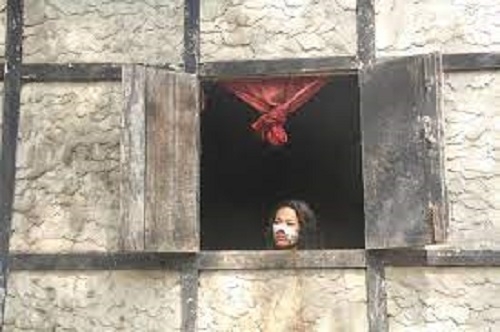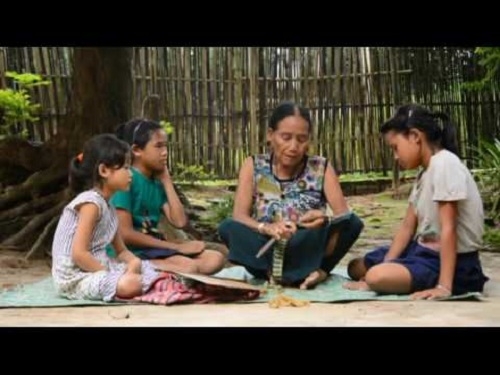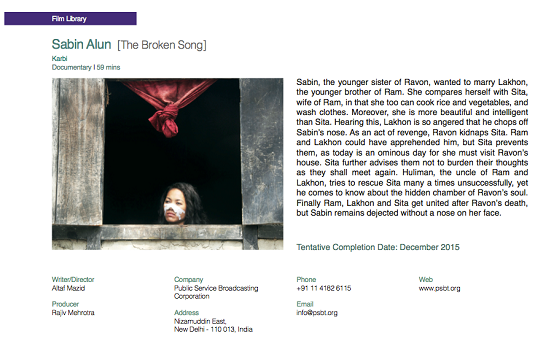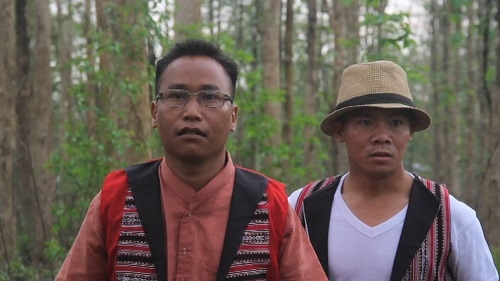The Karbi Ramayana III- The tradition of musical recitation of Sabin Alun
The Sabin Alun or Karbi Ramayana was composed by ‘Musician Rangsena’ on the instructions from the Supreme God ‘Hemphu’ for the people. So, Rangasena took birth as ‘Mirijang’ brothers and composed the ‘Sabin Alun’. In the Tretayuga, Sage Narada asked Valmiki to compose the story of Ram the Prince of Ayodhya and we come across similar episode in case of Sant Tulsidas who composed ‘Sri Ram Charit Manas’ or ‘Tulsi Ramayan’.
The Tulsi Ramayana became instrumental for millions of Indians to preserve, protect and practice even today their religious beliefs, traditions and cultural ethos even when they were forcibly taken to distant lands to work as plantation labors by the British and other invading Europeans in the 18th-19th centuries.

India is a Dharma-based society and nation. Thus, some rituals are observed while reciting holy books. Among the Karbis also some rituals are mandatory preceding the recital of ‘Sabin Alun’. These rituals, according to B K Gohain, are more or less similar to those adopted in worship of Supreme God Hemphu or the Creator i.e. Brahma. This Hemphu had blessed them that he would take ‘Avataar’ in the human form on this earth. The Karbi people believed that Hemphu fulfilled his promise by taking birth as King Dasharatha’s son Sri Ram.
The ritualistic process preceding the singing of ‘Sabin Alun’ is as follows: An earthen platform is prepared and a trident is placed on it. Two split bamboo pieces are put on the platform one with face down and the other with face up. Then nine pieces of bamboo are joined around the platform. A banana leaf is sprayed around the platform and powdered rice is then placed at the three corners where the fowl is sacrificed. The feathers of the fowl are kept on the platform with a ring of copper.
As the singer has taken the names of Ram and Lakshman and mentioned wars in the song, it becomes binding on his part to propitiate Ram and Lakshman in that way. However, according to some, “Sabin Alun’ can be sung sans all the above mentioned rituals. A mantra is chanted before commencing the singing of the story. This mantra means “those who listen to the song of Sri Ram, those who recite the story and the writer of the story can never perish”. Goswami Tulsidas also explained this in his ‘Sri Ram Charit Manas’ in a verse that reads as follows:
श्रोता, वक्ता, ग्याननिधि, कथा राम की गूढ़ | किमि समझूँ मैं जीव जड़ कलिमल ग्रसित विमूढ़||
That is the life of Sri Ram is a treasure house of knowledge for the speaker and his audience but I due to my longing for mundane pleasures, am unable to fathom its grandeur and glory.

The song commences like this:-
So, goes the song of Ram and Lakshman
That is in the days of yore King Dasharatha ruled the Earth
But his three queens dear, bore no child for his clan,
Seven years elapsed but no child was born,
So runs the song….
The singer further tells the audience how Dasharatha set out eastward and meets a sage on way who advises him to go to the King of demons as he has the boons to offer for birth of children to the queens. The King urges the sage to accompany him and be his guide but the sage agrees to take the king to show him the way for getting boons from the demon king.
The King implored, Be my companion and guide, O! Sage to the Kingdom of Demons
But the sage said, “I shall not go to the Kingdom of Demons,
But I shall show you the way for getting boons from him.
Choong Biripi is the name of the King’s sister
So, go and tell him, “I am your sister’s son”
Tell this to the King od Demons,
So runs the song…
Dasharatha follows the instructions of the sage and the Demon King offers him three oranges from a magical orange tree. The happy king returns home with the three fruits. As he reaches home two of them are snatched by another demon that came in the form of a crow. The king gives the only fruit to his three queens. They consume it and became pregnant.
Ram was born when rains stopped (In the month of Chaitra) and the trees withered away. At the time of his birth the Ravana’s crown falls to the ground. Considering this as bad omen, he summons his brother Bibhishana who is also an astrologer. He consults the holy books and tells Ravana that if he did not follow the righteous path, he would meet his end at the hands of Sri Ram. At this Ravana got angry and kicked Bibhishana who left Lanka on the same day.
Sri Ram was born and the crown of Ravana the King of Swarna Lanka
Falls from the Royal head
Ravana says, my crown fell down, please consult the books
His brother Bibhishana sees the books and says to the King
Today Sri Ram has taken birth; beware of him, O1 brother
Your shall meet your death at his hands alone
If your do not live well his brother Lakshman will cut off your heads.
Ravana angry with this revelation gives a slap to Bibhishana and also kicks him
Bibhishana, mortified goes home and thinks
I shall leave Lanka; I shall not stay here,
Sons and daughters do not disclose that I have left Lanka,
He tells his children.
So runs the story of Sri Ram….

There is a story associated with the birth of Sri Ram which has close resemblance with the Thai version of Ramayana. In Thailand the Ramayana is known as ‘Rammakian’ which literally means “Glory of Ram”. The Thai Rammakian also depicts Bibhishana as astrologer who advices Ravana on various issues by consulting the holy books. There is also a striking similarity in the episode related to the birth of the second son of Sita in ‘Sabin Alun’ and ‘Rammakian’.
In the Sabin Alun Sri Ram is depicted as a character hero in the perfect Karbi lifestyle who had to stay in his father-in-law’s house after his marriage and perform the household duties. So, after the marriage of Ram and Sita, King Janaka urges King Dasharatha to stay in his place for one year. Ram also wants Lakshman to stay back with him.
Janaka requests Dasharatha with these words:-
King Janaka says; let Sri Ram be in my house
For a year and only for a year I shall keep him here
King Dasharatha agrees and gives his consent.
Be it so, Sri Ram will help you in your house for one year
He is my eldest son and he will be the king
Do not keep him for long
For one year he will stay
So runs the Song ….
The Kaikayee episode is also narrated in a different manner. Here the character of Manthara, the maid who polluted Kaikayee’s mind and forcefully implored her to seek her boons from Dasharatha to send Ram to exile, is absent. Instead, it is Ravana who meets Kaikayee’s father who is the king of Kekaya Desh (present day Afghanistan) and seeks his help in banishing Ram to Dandaka forest from Ayodhya.
As the news of Sri Rama’s marriage with Sita reaches Ravana, he goes and meets King Kekaya, and asks him to call his daughter Kaikayee who is the most beloved queen of Dasharatha and ask her to get the two boons she had earlier invested with King Dashararha, seeking coronation of her son Bharat and banishment of Ram to exile for 12 years.
Kaikayee acts as per her father’s advice and obtains the two boons from Dasharatha. When Ram comes to know about this he readily agrees to go to the forest with Sita and Lakshman.
After the Shurpanakha episode and the elimination of Rakshasa Army in the Dandakaranya by Sri Ram alone, the terrified Shurpanakha rushes to Lanka and narrates every detail to Ravana and describes the beauty of Sita. Ravan abducts Sita with the help of Maricha the demon. While in search of her, Ram and Lakshman meet Sugriv and Hanuman.

Hanuman is considers as a popular hero in the Karbi society. He is known as ‘Holiman’. Earlier, the worship of Hanuman along with Sri Ram was also in vogue in Karbi society. Those who performed this ‘puja’ of Hanuman are known as ‘Teraon’ who considers them as ‘Kshatriyas’. A newborn child is places before the idol of Hanuman and prays granting him strength and intellect like Hanuman. The prayer somewhat runs like this-
O! Creator Hemphu
O! Vishnu and Shiva’s Avatara
Moon and Sun, Varun and Pawana, and
Sri Ram and Lakshman who took birth in Tretayuga
And their devotee Hanuman
Please make my child as strong and intelligent as you
Thus we pray to thee
The worship of Sri Ram was earlier in vogue in every Karbi household as they considered Ram as the ‘Adi Devata’. Those who recite the verses in ‘Sabin Alun’ are respected in the society and they are known as ‘Lunke’. It is a common belief in the Karbi society that whenever a ‘Lunke’ recites Sabin Alun with full devotion, the rains come. But Sri Rama’s influence on the Karbi society is still dominant. In case of long drought, the Karbis worship Indra and Ram. They also worship Ganesha whose name in Karbi is ‘Thekarech Vikarech’. Sri Ram is also worshipped at the time of Ganesha worship.
From birth to death, the influence of Sri Ram is seen on the Karbi society. Sri Rama’s name is chanted at the time of cutting the umbilical cord of the new born and at the time of death. It is widely believed in Karbi society that if the name of Sri Ram is chanted at the time of the death, the person surely goes to heaven. Such deep and indelible influence the Story of Sri Ram has cast on the Karbi society.
.
.
Total Views |

